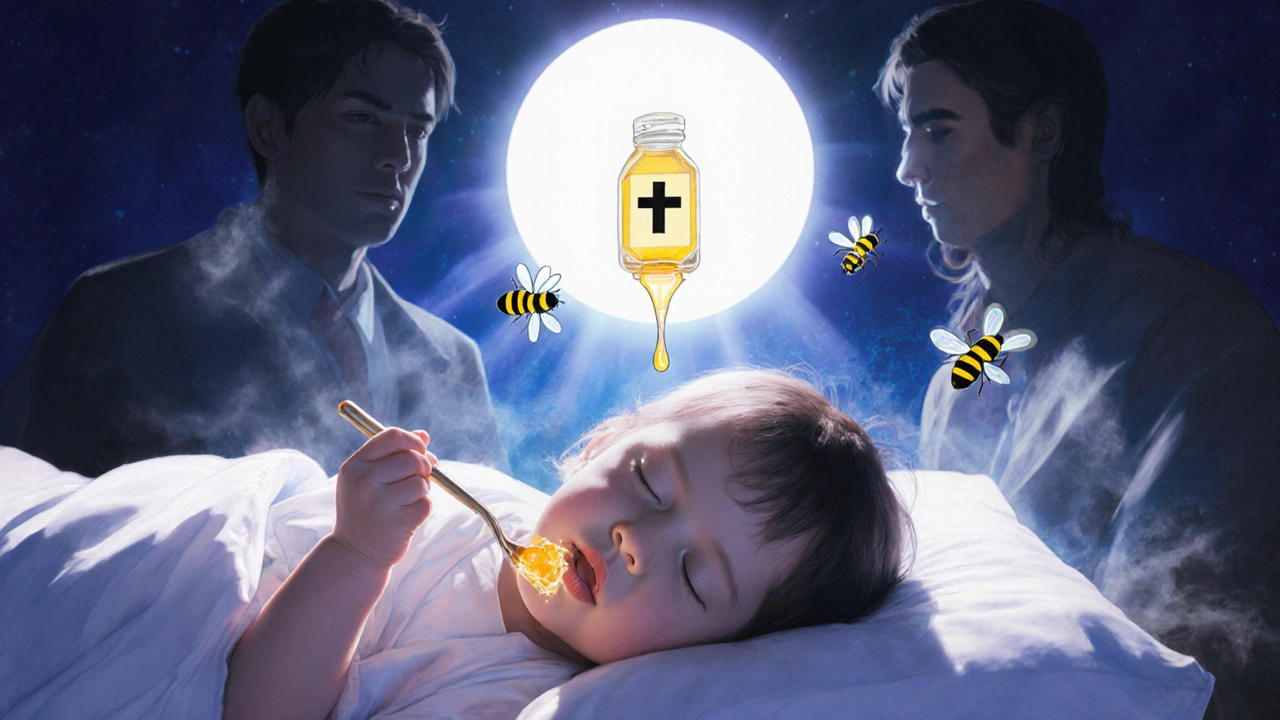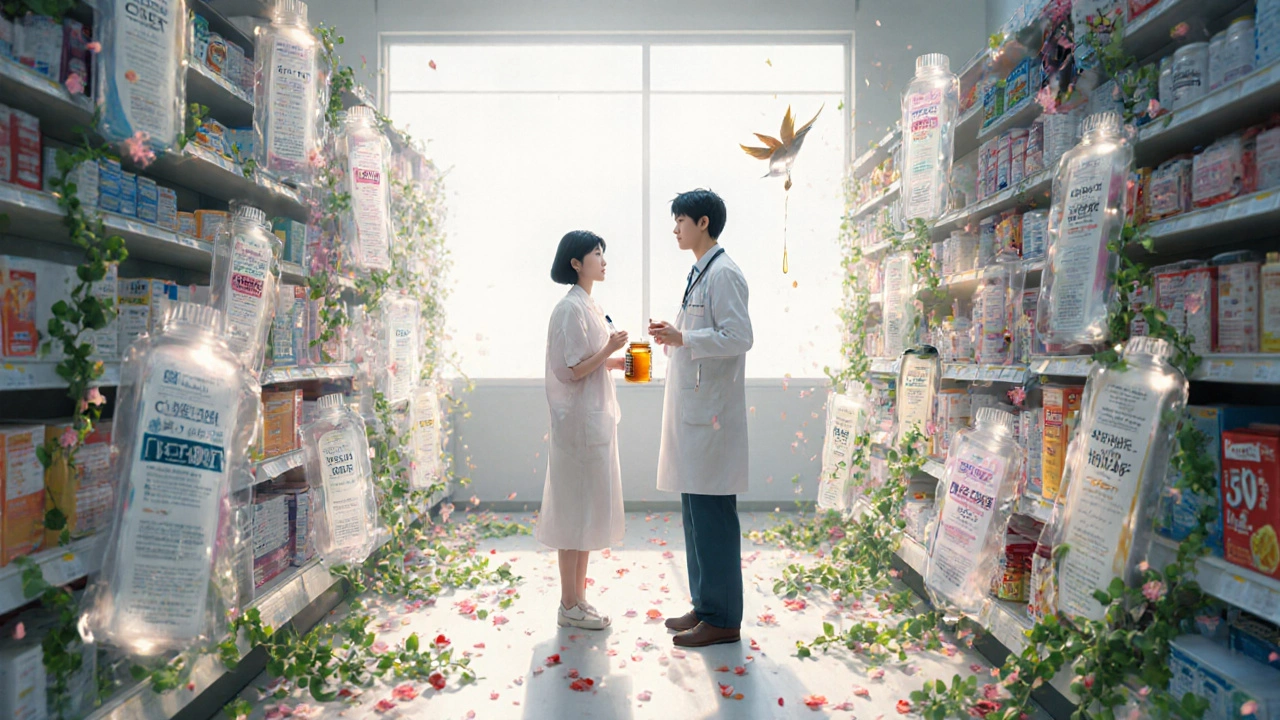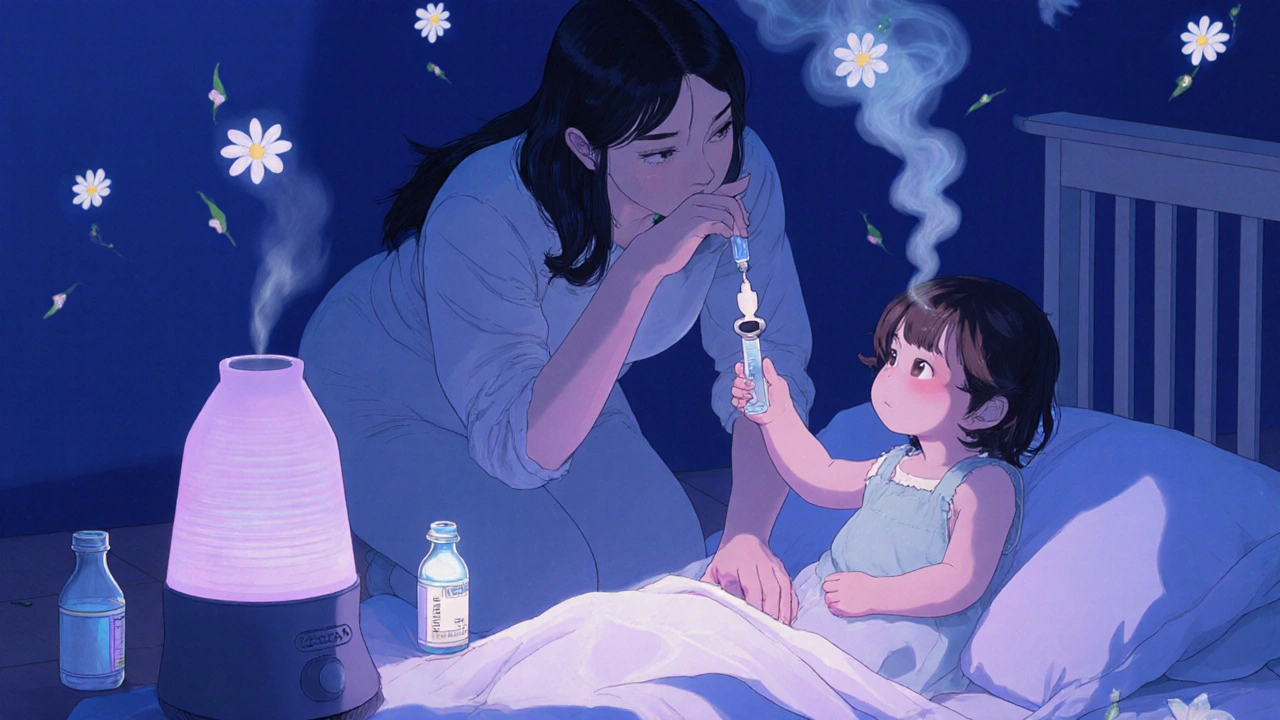Every winter, parents face the same exhausting cycle: a runny nose, a wet cough, a fever that spikes at night. You want to help your child feel better. So you reach for the cabinet-where bottles of Children’s Mucinex, Dimetapp, or Robitussin sit side by side, promising relief. But here’s the truth most packaging won’t tell you: cough and cold medicine for kids under 6 doesn’t work-and it can be dangerous.
Why OTC Cough and Cold Medicines Don’t Work for Young Kids
These medications were never proven to help children under 6. Not really. In 2007, the FDA reviewed decades of data and found zero solid evidence that antihistamines, decongestants, or cough suppressants actually reduced coughing or congestion in young kids. Yet they found plenty of evidence of harm: over 120 deaths linked to these products between 1969 and 2006, mostly from accidental overdoses or reactions to ingredients like dextromethorphan and pseudoephedrine.
Why? Because kids’ bodies aren’t small adults. Their livers can’t process these drugs the same way. A child under 2 has only about 23% of the liver enzymes needed to break down dextromethorphan safely. That means even a tiny bit too much can build up fast-leading to seizures, fast heart rate, or breathing trouble. And because these medicines often contain multiple active ingredients, parents might give two products thinking they’re helping, not realizing both contain acetaminophen or diphenhydramine. That’s how liver damage or severe drowsiness happens.
The Official Rules: What the Experts Say
Every major medical group in the U.S. agrees on this:
- The FDA says: Don’t use OTC cough and cold products in children under 2. For kids 2 to under 6, use only if a doctor says so.
- The American Academy of Pediatrics says: Don’t use them at all under 4. For ages 4 to 6, talk to your pediatrician first.
- The Mayo Clinic, Cincinnati Children’s, and Nationwide Children’s all say: Avoid these meds in kids under 6. Period.
Even the Consumer Healthcare Products Association, which represents drug makers, agreed in 2008 to put “Do not use in children under 4” on labels. But here’s the problem: not all products follow that rule. A 2021 FDA inspection found 22% of pediatric cold products still lacked clear warnings. And many parents don’t read labels carefully-or worse, use adult versions because they think “it’s the same ingredient.”
What Happens When Kids Take These Meds?
Real stories from ERs and parent forums paint a clear picture:
- A 3-year-old given Children’s Dimetapp becomes hyperactive, can’t sleep for 12 hours, and vomits.
- A 22-month-old gets a mix of Tylenol Cold and generic cough syrup-both contain acetaminophen. Liver enzymes spike. Hospitalized.
- A 1-year-old is given a teaspoon of adult Robitussin because the kid’s version was out of stock. Result: rapid heartbeat, confusion, and a trip to the ER.
Side effects aren’t rare. Between 2004 and 2005, nearly 7,100 children under 11 were treated in U.S. emergency rooms for bad reactions to cough and cold meds. The worst cases? Kids aged 2 to 3. Black and Hispanic children were more likely to be affected-likely because of less access to clear medical advice or confusion around dosing.

What You Can Do Instead: Safe, Proven Alternatives
There’s good news: you don’t need pills to help your child feel better. Here’s what actually works, backed by science and trusted by pediatricians:
- Saline nasal drops + bulb syringe: For babies under 6 months, this is the gold standard. Put 2 drops in each nostril, wait 30 seconds, then gently suck out mucus. Do this before meals and bedtime. It helps breathing and eating.
- Cool-mist humidifier: Run one in the bedroom. Moist air loosens congestion. Never use warm mist-it can burn skin and swell nasal passages.
- Honey: For kids 1 year and older, give ½ to 1 teaspoon before bed. Honey thickens mucus and soothes the throat. One study showed it worked better than dextromethorphan at reducing nighttime cough. Don’t give honey to babies under 1-it can cause botulism.
- Acetaminophen or ibuprofen: For fever, pain, or fussiness. Use the right dose: 10-15 mg per kg of body weight every 4-6 hours for acetaminophen. Never exceed 5 doses in 24 hours. Always use the measuring cup or syringe that came with the bottle-not a kitchen spoon.
- Extra fluids: Water, breast milk, or formula. Keeping your child hydrated thins mucus and prevents dehydration.
One parent in Austin told me: “I used to panic when my son coughed. Then I tried honey and saline. Within two days, he was sleeping through the night. No meds. No stress.”
What to Avoid at All Costs
Some things you might think are harmless are actually risky:
- Adult medicines: Never give your child a medicine made for adults. Even half a tablet can be too much.
- Combining products: Don’t give Tylenol Cold + Children’s Mucinex. Both likely have acetaminophen. Too much = liver failure.
- Nasal sprays like oxymetazoline: These are for adults only. In kids, they can cause rebound congestion or high blood pressure.
- Herbal remedies or essential oils: No regulation. No proof. Some, like eucalyptus oil, can cause seizures in young children if inhaled.
How to Measure Medicine Correctly
One of the biggest reasons kids get overdosed? Using kitchen spoons. A teaspoon isn’t 5 mL. A tablespoon isn’t 15 mL. And “a capful” means nothing.
Always use the dosing tool that comes with the bottle-usually a syringe or cup with clear markings. If you lose it, ask your pharmacy for a free one. Write down the dose and time on your phone. Set a reminder. Double-check the label every time. Even a 10% overdose can cause serious side effects in a 2-year-old.

When to Call the Doctor
Most colds get better in 7-10 days. But watch for these red flags:
- Fever over 102°F that lasts more than 3 days
- Difficulty breathing, fast breathing, or flaring nostrils
- Cough lasting more than 2 weeks
- Refusing to drink or urinating less than 3 times in 24 hours
- Lethargy, extreme fussiness, or not waking up to eat
If you’re unsure, call your pediatrician. Don’t guess. Don’t wait. A quick call can prevent a trip to the ER.
What’s Changing? The Future of Cold Care for Kids
Things are slowly improving. A 2023 study showed that when parents got a simple 5-minute educational talk from their doctor, inappropriate OTC use dropped by 58%. More pharmacies now stock only labeled pediatric products. The FDA is pushing harder for consistent labeling. And honey is now officially recommended as first-line treatment for cough in kids over 1.
But the biggest change? Parents are starting to believe that less is more. You don’t need a medicine cabinet full of bottles to care for a sick child. Sometimes, rest, fluids, and a humidifier are all you need.
Can I give my 3-year-old cough medicine if I use half the adult dose?
No. Adult medicines are not scaled-down versions of children’s meds-they have different ingredients, concentrations, and safety profiles. Even half a tablet can be toxic. Always use products labeled for children and follow the age-specific dosing instructions.
Is honey safe for toddlers with cough?
Yes, for children 1 year and older. Honey helps soothe the throat and thin mucus. Give ½ to 1 teaspoon before bed. Never give honey to babies under 1 year-it can cause infant botulism, a rare but serious condition.
What should I do if my child accidentally takes too much cough medicine?
Call Poison Control immediately at 1-800-222-1222. Do not wait for symptoms. Even if your child seems fine, ingredients like dextromethorphan or pseudoephedrine can cause delayed, life-threatening reactions. Keep the medicine bottle handy when you call.
Why do pharmacies still sell these products if they’re unsafe?
They’re still legal for older children and adults. The FDA restricts use in kids under 2 and advises against use under 6, but doesn’t ban sales. Many parents still buy them out of habit or pressure from family. The goal is education-not removal-so parents make safer choices.
Are natural remedies like vapor rub or steam safe?
Vapor rubs with menthol or camphor should be avoided in kids under 2. Steam from a hot shower can help, but never put a child in a hot bath or near boiling water. Cool-mist humidifiers are safer and more effective. Avoid essential oils-they’re not regulated and can be toxic when inhaled by young children.
Final Takeaway: Less Medicine, More Care
It’s hard to watch your child suffer. You want to fix it. But the best thing you can do isn’t reach for a bottle-it’s reach for a syringe of saline, a spoon of honey, and a calm voice. Colds are viral. They run their course. Medicines won’t speed that up. But the right care-hydration, rest, clean air, and comfort-will get them through. And that’s more powerful than any pill ever was.


Alyssa Fisher
November 8, 2025 AT 19:27It's wild how we've been sold this illusion that medicine equals care. We reach for bottles like they're magic wands, but the real healing? It's in the quiet moments-holding a kid while they cough, reading the same story for the tenth time, running a humidifier all night. No label on a bottle says that. But it's what actually works.
And honey? Seriously. It's not just folklore. There's peer-reviewed data backing it. Why do we trust chemicals with unknown long-term effects on developing livers more than a natural substance humans have used for thousands of years? I don't get it.
It’s not about being anti-medicine. It’s about being pro-wisdom.
Alyssa Salazar
November 10, 2025 AT 12:43Let’s be real-OTC pediatric cold meds are a regulatory loophole dressed up as parental reassurance. The FDA didn’t ban them because the pharma lobby has deep pockets. They’re still sold because profit > pediatric safety. And don’t even get me started on how the labeling is intentionally confusing-'for ages 2+' but no clear dosing? That’s not negligence, that’s predatory.
Parents aren’t stupid. They’re exhausted. And the system exploits that exhaustion. Honey? Saline? Humidifiers? Those are the real MVPs. Why aren’t these promoted as hard as the meds? Because they don’t have shareholders.
Beth Banham
November 11, 2025 AT 21:33I used to panic every time my daughter got a cold. Then I read this. I stopped buying the little bottles. Started using saline drops before bed. Gave her honey when she turned one. She sleeps better. I sleep better. No ER visits. No stress.
It’s not glamorous. But it works.
Thanks for writing this. I needed to see it in writing.
Brierly Davis
November 13, 2025 AT 03:34YES. This. So much yes.
I used to give my 4-year-old whatever was 'closest' to the right dose. Then I learned about the acetaminophen overlap. Holy crap. I almost poisoned my kid because I thought I was helping.
Now I keep a printed dosing chart taped to the fridge. I use the syringe. I set alarms. I never combine products.
Parenting is hard enough. We don’t need to make it riskier with outdated myths. Thanks for the clarity 😊
Amber O'Sullivan
November 14, 2025 AT 04:00Jim Oliver
November 15, 2025 AT 21:51William Priest
November 15, 2025 AT 22:53like bro why are we even having this convosation? i mean come on. my grandma used to rub Vicks on my chest and i turned out fine. also my cousin took a whole bottle of cold syrup when he was 3 and he’s now a lawyer. so like... maybe it’s not that bad? maybe we’re overthinking it?
also i think honey is for bees not for kids lmao
Ryan Masuga
November 16, 2025 AT 07:53Man I remember when I was a new dad and I felt so guilty not giving my son something 'for the cough.' Like I was failing if I didn't have a bottle ready.
Then I found out the truth: his body was doing the work. All I had to do was hold him, keep him hydrated, and let him rest.
Now I tell every new parent I know: skip the medicine cabinet. Get a humidifier. Buy honey. Learn how to use a bulb syringe.
It’s not sexy. But it’s real. And it works.
Also-yes, honey works better than dextromethorphan. The science is solid. Don’t let anyone tell you otherwise.
Jennifer Bedrosian
November 16, 2025 AT 14:35OMG I JUST REALIZED I GAVE MY 3 YEAR OLD TWO DIFFERENT COLD MEDS LAST WEEK BECAUSE I THOUGHT ONE WAS FOR COUGH AND ONE WAS FOR STUFFY NOSE BUT NOW I THINK THEY BOTH HAD ACETAMINOPHEN I’M SO SCARED WHAT DO I DO??
PLEASE TELL ME SHE’LL BE OK I’M CRYING RIGHT NOW I CAN’T BELIEVE I DID THIS I JUST WANTED HER TO FEEL BETTER WHY DID NO ONE TELL ME THIS BEFORE??
Lashonda Rene
November 17, 2025 AT 03:44i just want to say thank you for writing this because i used to think that if i didnt give my kid medicine then i wasnt being a good mom like i wasnt doing enough you know? like there was this pressure from family and even from some doctors to just give something to make it go away
but then i read about the liver thing and how kids arent just little adults and i started using saline and honey and honestly it was so much easier than i thought it would be
my daughter still gets sick but now she sleeps better and i sleep better too and i dont feel guilty anymore
also i bought a dosing syringe and i write the time down on my phone and i dont use kitchen spoons anymore
you helped me feel less alone in this
thank you
Andy Slack
November 17, 2025 AT 19:31Let me just say this: the most powerful tool you have as a parent isn’t a bottle. It’s presence.
When your kid is sick, they don’t need a pill. They need you. A cool room. A quiet voice. A hug that says, ‘I’m here.’
Saline. Honey. Humidifier. Water.
That’s the real medicine.
And you’re already doing it.
You’ve got this.